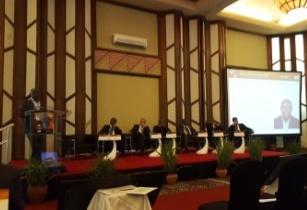Squeezing oil and gas and other precious commodities without considering opportunities to leverage sustainable long-term growth will be detrimental to energy progress in Africa, according to Emeka Ene, CEO Oildata and Xeneri
Addressing delegates at the inaugural Africa Energy and Technology Conference, held from 5-7 December at the Safari Park Hotel in Nairobi, Kenya, Ene said that the world is headed towards a more balanced energy mix in the years to come, including an expected upsurge in natural gas as a significant fuel.
But industry stakeholders must recognise how energy enables foreign direct investment, which consequently demands new and sophisticated forms of thinking to maximise sustainable capital opportunities, he added.
“If we focus on economic corridors and think that energy itself is not seen as just purely commodities to be exploited, we can accelerate development.
“In other words, we should not just focus on the upstream, we need to think through the midstream and downstream.”
He explained that in 30 years the East Coast Petrochemical Corridor in Malaysia has driven unemployment down to five per cent, accrued foreign direct investment totalling US$7bn, and has created over 500,000 jobs in the process.
“If that oil was simply a commodity to be exported, all this would not exist,” he stated.
Ene began his presentation by asking why Africa “keeps running into a brick wall every six or so years?”
“We know the cycle is going to come and yet the industry goes straight off the cliff every single time,” he asserted.
He moved on to compare Africa’s energy struggle in the 21st century to kobe na sungura, translated from Swahili to mean “the story of the tortoise and the hare”; despite the challenges, the tortoise remained focused, ignored distractions and achieved its goal.
In order to illustrate the importance of the story to Africa’s energy path, Ene identified three elements for successful strategies on the continent: correlating channels of opportunity, collaboration and capitalisation.
“These three things are essential if you want to provide a method and approach to energy for Africa or it won’t make much of an impact,” he commented.
Addressing the first element, Ene said energy can play a part in addressing the infrastructure deficit the continent faces, with entrepreneurship thriving in countries such as Uganda, Ethiopia and Nigeria — outstripping economic superpower China, as well as Turkey, Mexico and the Netherlands.
Africa’s energy sector can carve a path towards sustainable growth, he reiterated, mentioning energy hot spots such as Angola, Mozambique and Uganda and the recent news of ExxonMobil’s oil discovery in Nigeria.
He said there is also a need for engineers and geoscientists to look beyond the technology boom to look at ways of driving future trade.
On collaboration, he noted that Africa has to be open to new ways of thinking by looking at changing business models.
Referencing the strong collaborative work undertaken by the Petroleum Technology Association of Nigeria (PETAN), Ene asked the audience whether there is an opportunity to leverage collaboration between east and west Africa to bring costs down and promote investment.
“To win at this game we must deliver the same assets and technology but this time we don’t have the liberty of US$100 oil, so we cannot do things with an unlimited budget anymore. As geoscientists, we have to think outside the box if we are to sustain our business.”
Capitalisation, he said, occurs when the industry acts end-to-end and clusters around its competitive advantages.
He added that the industry cannot ignore COP21; for Africa it presents an opportunity.
In a wide-ranging session entitled “Africa in the 21st Century; Frontier plays and challenges”, Patrick Obath from Adam Smith International Africa, opened proceedings with the statistic that Africa accounts for 30 per cent of the earth’s remaining mineral resources in oil, gas and mining.
However, he said that tensions were prevalent not only between competitors for these resources, but also in infrastructure development.
The continent still relies heavily on biomass as its source of energy, but “when it comes to climate change, Africa only omits four percent in carbon dioxide emissions as a continent — so we’re still clean”, he qualified.
“When you look at Africa as a continent, it has a lot of potential but it has not developed at the same pace as the rest of the world. With the the coming of oil and gas into this continent — the first exploration started in 1907 and the first drilling in 1953 or thereabouts — we haven’t had a very high pace of oil and gas development. It is good now that parts of the continent such as the East African coast are beginning to get attention.”





















